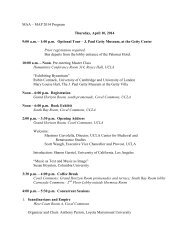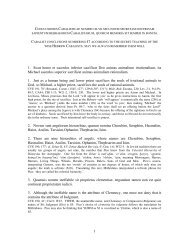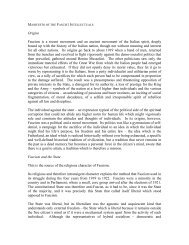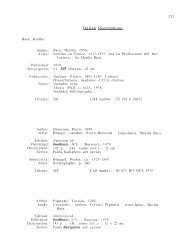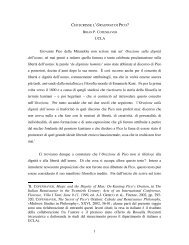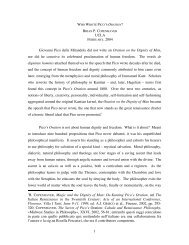1 (1) Pythagoras of Samos instructed the region of Italy once called ...
1 (1) Pythagoras of Samos instructed the region of Italy once called ...
1 (1) Pythagoras of Samos instructed the region of Italy once called ...
You also want an ePaper? Increase the reach of your titles
YUMPU automatically turns print PDFs into web optimized ePapers that Google loves.
<strong>the</strong> soul is, in its very nature, separable.’ And <strong>the</strong>n: ‘If sense, <strong>the</strong>n both imagination and<br />
desire. For wherever <strong>the</strong>re is sense, both distress and pleasure also are, and where <strong>the</strong>se<br />
are, <strong>of</strong> necessity <strong>the</strong>re is also strong desire. But it is not yet clear about mind and <strong>the</strong><br />
power <strong>of</strong> contemplation. This seems to be a different kind <strong>of</strong> soul, however, and it<br />
happens to be separated, as <strong>the</strong> eternal is from <strong>the</strong> corruptible. But o<strong>the</strong>r parts <strong>of</strong> <strong>the</strong> soul<br />
are not separable, as some say <strong>the</strong>y are, which is clear from <strong>the</strong> foregoing argument.<br />
Obviously, however, <strong>the</strong> parts are rationally distinct.’ 154<br />
(12) And why would he not suppose that perishing part <strong>of</strong> <strong>the</strong> soul, since it is corruptible<br />
and almost bestial, to be separate from <strong>the</strong> eternal and divine? In <strong>the</strong> books On <strong>the</strong><br />
Generation <strong>of</strong> Animals, he wants it to come to be from <strong>the</strong> body itself, stating: ‘The body<br />
comes from <strong>the</strong> female, <strong>the</strong> soul from <strong>the</strong> male, for <strong>the</strong> soul is <strong>the</strong> usia <strong>of</strong> a particular<br />
body.’ And also: ‘… <strong>the</strong>n if <strong>the</strong> male is <strong>the</strong> maker <strong>of</strong> this sort <strong>of</strong> soul.’ (13) And in <strong>the</strong><br />
books On <strong>the</strong> Soul: ‘Since usia is used in three ways, as we have said, one <strong>of</strong> <strong>the</strong>se being<br />
“form,” ano<strong>the</strong>r “matter,” and a third “what comes from both,” <strong>the</strong>n, <strong>of</strong> <strong>the</strong>se three,<br />
matter is potency and form is entelechy. Because what comes from <strong>the</strong>m is <strong>the</strong> ensouled,<br />
<strong>the</strong> body is not <strong>the</strong> entelechy <strong>of</strong> <strong>the</strong> soul, but <strong>the</strong> soul itself is <strong>the</strong> entelechy <strong>of</strong> some body.<br />
Hence <strong>the</strong>y have <strong>the</strong> correct view who see <strong>the</strong> soul as nei<strong>the</strong>r being without body nor<br />
being any body, for in fact it is not a body but something <strong>of</strong> a body.’ 155<br />
(14) And elsewhere: ‘But <strong>of</strong> things that are, we say that usia is one kind. Of this,<br />
fur<strong>the</strong>rmore, we call matter what in itself is not a this <strong>of</strong> any sort; while form and species<br />
is just that according to which we call something a this; and <strong>the</strong> third is what comes from<br />
both. But matter is potency, form is entelechy, and entelechy is tw<strong>of</strong>old: one kind is like<br />
expertise, for example, ano<strong>the</strong>r like contemplating. Now usiae are regarded as bodies<br />
especially, particularly natural bodies since <strong>the</strong>se are principles <strong>of</strong> o<strong>the</strong>r bodies. Among<br />
natural bodies, however, some have life, and some do not have it. We say that life is selfnourishing,<br />
also growth and decay. (15) Therefore, every natural body that shares in life<br />
is an usia, but usia understood in this way as composite. Since a body <strong>of</strong> this kind – one<br />
having life – also exists, <strong>the</strong> soul will not be a body, for a body is a subject and matter<br />
ra<strong>the</strong>r than what accords with a subject. Necessarily, <strong>the</strong> soul is usia as <strong>the</strong> form <strong>of</strong> a<br />
natural body with <strong>the</strong> potency to have life.’ And a little fur<strong>the</strong>r on: ‘Accordingly, it<br />
makes no sense to ask if <strong>the</strong> soul and body are one, nor likewise wax and its shape, nor,<br />
in general, <strong>the</strong> matter <strong>of</strong> any thing and that <strong>of</strong> which it is <strong>the</strong> matter.’ 156<br />
(16) Given <strong>the</strong>se twists <strong>of</strong> words and meanings, who does not see that Aristotle’s<br />
understanding <strong>of</strong> <strong>the</strong> soul was quite inept? The souls <strong>of</strong> <strong>the</strong> dead that made <strong>the</strong>mselves<br />
manifest to various people (as Homer and all <strong>the</strong> magicians agree) could have reminded<br />
him that <strong>the</strong>y nei<strong>the</strong>r perish nor come from <strong>the</strong> body nor lack feelings, or else <strong>the</strong>y were<br />
compounded <strong>of</strong> two parts and natures, like an animal whose body is <strong>the</strong> container <strong>of</strong> <strong>the</strong><br />
soul. But one part <strong>of</strong> <strong>the</strong> soul cannot be <strong>called</strong> <strong>the</strong> container <strong>of</strong> ano<strong>the</strong>r part <strong>of</strong> <strong>the</strong> soul,<br />
unless perhaps he wants it to be <strong>the</strong> covering <strong>of</strong> a bodily container. Moreover, on<br />
154 Zippel cites Arist. An. 413 a 4-5, b 22-9.<br />
155 Zippel cites Arist. Gen. An. 738 b 25-6, 41 a 13-14; An. 414 a 14-21.<br />
156 Zippel cites Arist. An. 412 a 6-21, b 6-8.<br />
42<br />
2/21/05 9:35 PM 42/44



